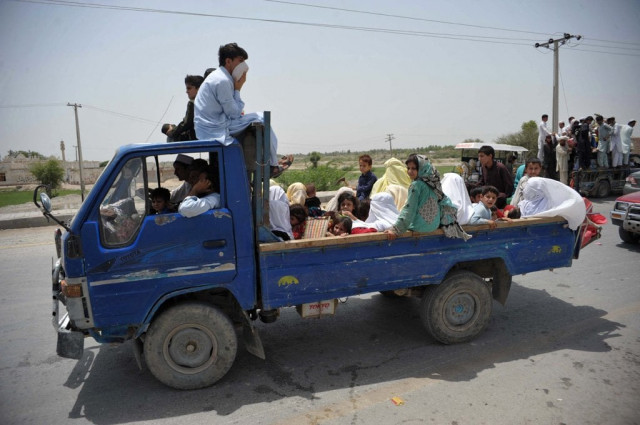Planning blight
When govt authorised Zarb-e-Azb it must have realised that it will result in massive displacement of civilians.

A major source of concern for a range of agencies is the possibility of the spread of the polio virus. To a large extent the current outbreak was ‘corralled’ in the tribal agencies and particularly, North Waziristan but that changed on June 14 with the commencement of the operation. A pool of unvaccinated children has now moved out of North Waziristan and the administration at Bannu is saying that all children coming out of the agency must be vaccinated. Fifty out of the 83 polio cases reported so far this year have their origins in North Waziristan, and there is every reason to be concerned that the spread of the virus will mirror the spread of the IDPs, who rather than going to the camps that have been set up for them are dispersing themselves in communities where they have family links. This makes it all the more difficult to track and immunise the children of each family.
Families are refusing to go to government camps for a range of reasons — lack of water and sanitation and the difficulty of maintaining purdah in a tented encampment among them. For many families, this will be their first time outside the closed society of the area where a conservative tribal culture dominates and adapting so quickly to life in a different environment is going to be extremely difficult. None of the IDPs has any idea when they may return to their homes. To add to the difficulties, there are problems of health staff coordination and a simple lack of numbers of health staff to address a massive influx. The DHOs have deployed health workers in medical camps set up for the IDPs meaning that there are fewer workers available as vaccinators.
Given that the decision to launch the operation was taken at the federal level, it ought to follow that the federal government resources, and quickly, the provincial government of K-P which is now looking at coping with an IDP population that is likely to top-out at half a million for an indeterminate period of time. The military operation is in its early stages as yet and largely limited to airstrikes rather than ground operations. There are anecdotal but persistent and consistent reports that the extremists that the military are there to fight have themselves relocated. If that proves to be the case, the military will want to consolidate their hold and, as they did in the Swat valley, want to settle in for a prolonged period of occupation in order to deny the territory to the extremists.
About 300,000 people remain in North Waziristan and about 307,000 have left. Neither of these populations is now self-sustaining and both are dependent on the state for their well-being. The cash relief being given to families at the registration and checkpoints will sustain them for a few days at most. This situation was foreseeable and the fact that there are now over half a million people without means of support is entirely the responsibility of the government at federal level and planning provision should have been made for this eventuality. The government has done nothing to bolster the confidence that the indigenous population of NW have in it, merely deepened the well of bitterness and resentment.
Published in The Express Tribune, June 24th, 2014.
Like Opinion & Editorial on Facebook, follow @ETOpEd on Twitter to receive all updates on all our daily pieces.















COMMENTS
Comments are moderated and generally will be posted if they are on-topic and not abusive.
For more information, please see our Comments FAQ